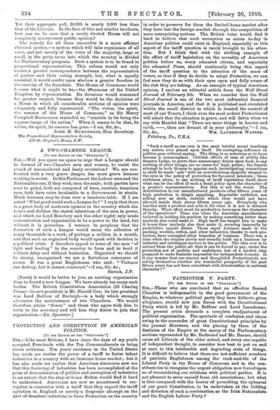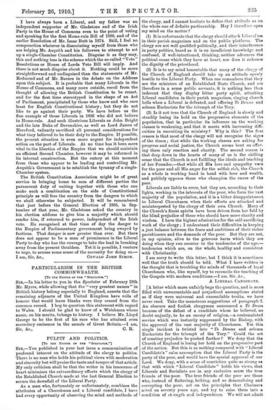PATRIOTISM V. PARTY.
[To TIM EDITOR Or THE " SPECTATOR:]
SIR,—Those who are convinced that an effective Second Chamber is indispensable to the good government of the Empire, to whatever political party they have hitherto given allegiance, should now join forces with the Constitutional Party which. is led by Mr. Balfour and Lord Lansdowne. The present crisis demands a complete readjustment of political organisation. The spectacle of confusion and chaos owing to the surrender of great Constitutional principles by the present Ministers, and the placing by them of the destinies of the Empire at the mercy of the Parliamentary sections represented by Mr. Redmond and Mr. Barnes, should cause all Liberals of the older school, and every one capable of independent thought, to consider how beat to put an end at once to this intolerable and degrading state of things. It is difficult to believe that there are -not sufficient numbers of patriotic Englishmen among the rank-and-file of the Liberal Party in the House of Commons and in the con- stituencies to recognise the urgent obligation now forced upon us of reconsidering our relations with political parties. It is not pleasant to sever oneself from old associations ; but what is that compared with the horror of permitting the upheaval of our great Constitution, to be undertaken at the bidding and dictation of such a combination as the Irish Nationalists and the English Labour Party ?
I have always been a Liberal, and my father was an independent supporter of Mr. Gladstone and of the Irish Party in the House of Commons even to the point of voting and speaking for the first Home-rule Bill of 1886, and of the earlier Resolution of Mr. Isaac Butt in 1874. Still, I feel no compunction whatever in dissociating myself from those who are helping Mr. Asquith and his followers to attempt to set up a single-Chamber Constitution. Disguise it as they may, this and nothing less is the scheme which the so-called "Veto" Resolutions or House of Lords Veto Bill will imply. And there is not much disguise about it. Nothing could be more straightforward and undisguised than the statements of Mr. Redmond and of Mr. Barnes in the debate on the Address upon this subject. It is probable that many Liberals in the House of Commons, and many more outside, recoil from the thought of allowing the British Constitution to be recast, and for the first time stereotyped in the shape of an Act of Parliament, precipitated by those who know and who care least for English Constitutional history ; but they do not like to go against their party. We have before us the fine example of those Liberals in 1886 who did not believe in Home-rule. And such illustrious Liberals as John Bright and the late Duke of Devonshire, as well as Lord James of Hereford, valiantly sacrificed all personal considerations for what they believed to be their duty to the Empire. If possible, the present situation is even more urgent for independent action on the part of Liberals. At no time has it been more vital to the liberties of the Empire that we should maintain an efficient Second Chamber, however it may be reformed in its internal construction. But the outcry at this moment from those who appear to be leading and controlling Mr. Asquith's Government is to establish the tyranny of a single- Chamber system.
The British Constitution Association might be of great service in bringing home to men of different parties the paramount duty of uniting together with those who can make such a combination on the side of Constitutional principle as will free the country from the dangers to which we shall otherwise be subjected. It will be remembered that just before the General Election of 1885, in Sep- tember of that year, Mr. Gladstone asked the country in his election address to give him a majority which should render him, if returned to power, independent of the Irish vote. He recognised at that time of day the danger to the Empire of Parliamentary government being swayed by factions. That danger is now greater than ever. But there does not appear to be a man of prominence in the Liberal Party to-day who has the courage to take the lead in breaking away from the present thraldom. Yet it is possible, I venture to urge, to arouse some sense of the necessity for doing so.—











































 Previous page
Previous page